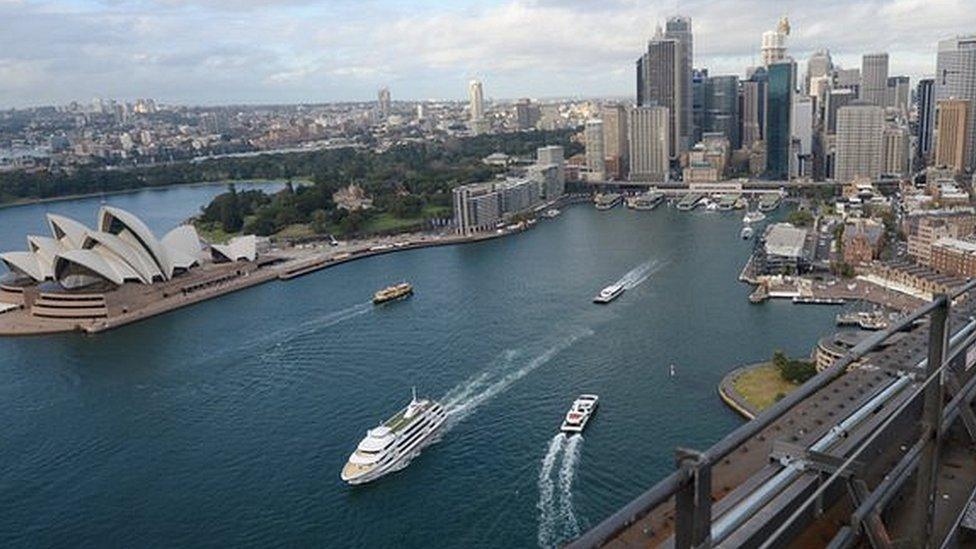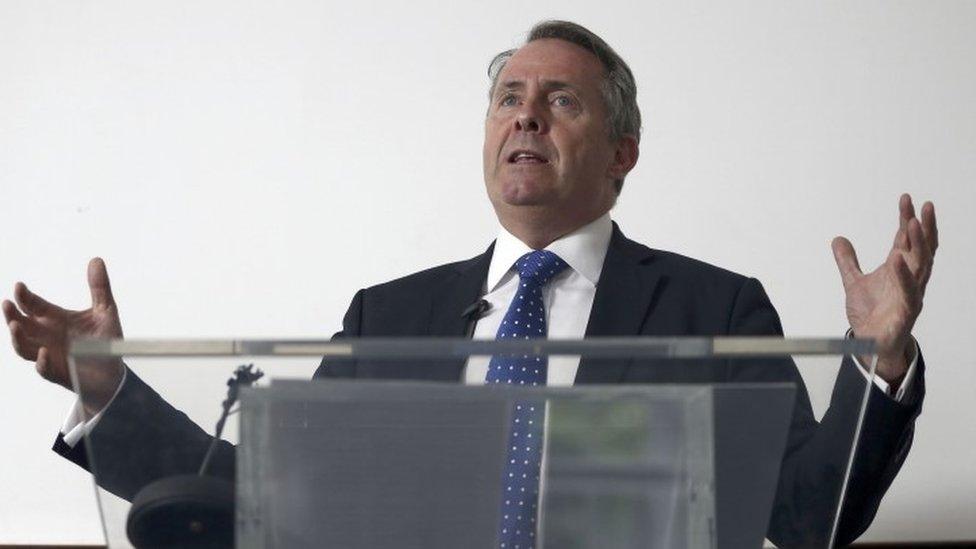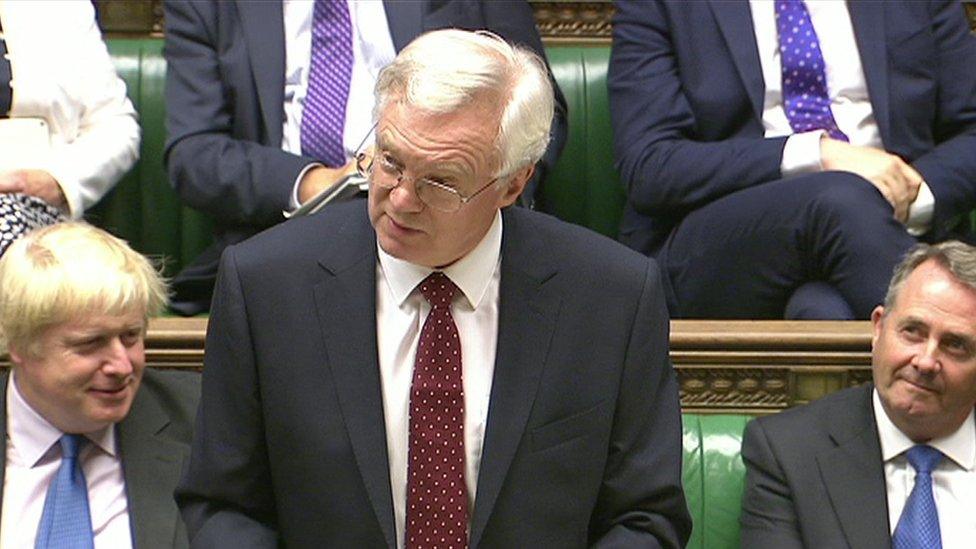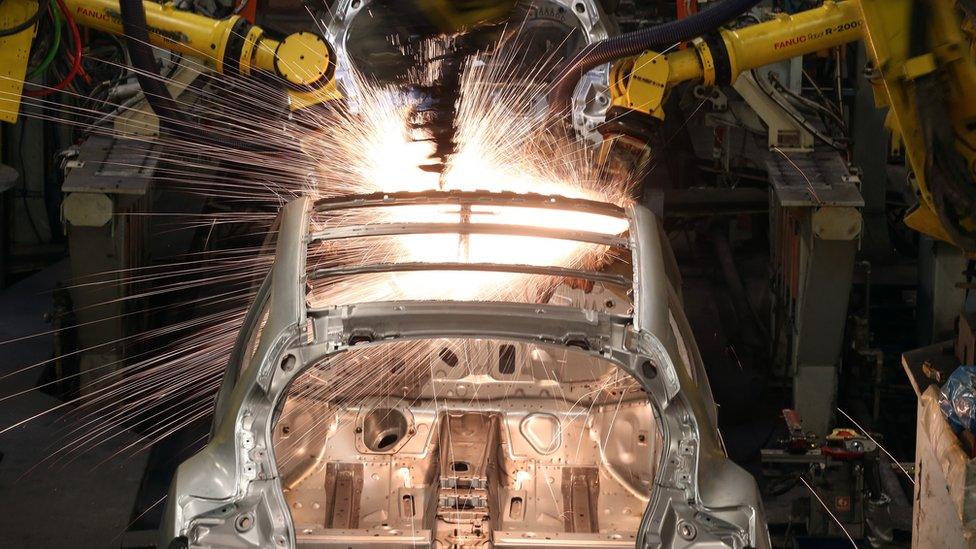Theresa May: UK will lead world in free trade
- Published

Australian politicians are keen to strike a trade deal with the UK once it leaves the EU
Theresa May said the UK could become "the global leader in free trade" as she faced calls to clarify the government's post-Brexit vision.
Making a G20 summit statement, the PM refused to give a "running commentary" or "reveal our hand prematurely".
She was speaking in the Commons after Australia and the UK began "preliminary discussions" about a new trade deal.
Australian trade minister Steven Ciobo predicted an agreement between the countries "when the time is right".
But with the UK unable to sign deals while still in the European Union, he said an agreement would not be able to happen until the UK left the EU in two-and-a-half years' time.
Australia has been earmarked as the first potential new trade partner for the UK once it leaves the EU.
Addressing MPs, Mrs May said India, Mexico, South Korea and Singapore were also keen to remove trade barriers.
She pledged to "think through the issues in a sober and considered way", adding: "So we will not take decisions until we are ready. We will not reveal our hand prematurely and we will not provide a running commentary on every twist and turn of the negotiation."
During her statement, Mrs May was urged to set out what the government wanted to achieve from Brexit negotiations, with the SNP's Westminster leader Angus Roberston asking: "Does she seriously expect to be able to hold out for years in not confirming whether she wants the UK to remain a member of the single market?"
Labour leader Jeremy Corbyn said it was "unclear" what the government was "trying to do".
He accused Mrs May of supporting "free trade dogma" rather than a policy that "values human rights and human dignity".
The Labour leader later faced calls to clarify whether he supported the UK's continuing membership of the EU single market.
Labour sources said Mr Corbyn thought the UK's Brexit negotiations should aim to secure "full access to the single market" in goods and services.
But a spokesman for the Labour leader said Mr Corbyn had campaigned against aspects of the single market and would oppose a deal that included "aspects of the existing architecture" that were damaging to working people and public services.
Asked if Mr Corbyn wanted the UK to remain a full member of the EU single market the spokesman said there was a question about what "membership of the single market" actually meant.
Labour MP and Remain campaigner Chuka Umunna called for clarity from his party, saying: "Labour should be fighting for Britain to stay in the single market, not turning a blind eye to its advantages."
Australia-UK talks
The government does not plan to begin the formal two-year Brexit process by triggering Article 50 of the Lisbon Treaty until the start of next year at the earliest.
Brexit Secretary David Davis has predicted , externala "round of global trade deals" will be "fully negotiated" within 12 to 24 months, coming into force when the UK leaves the EU.
Speaking to BBC Radio 4's Today programme after meeting UK International Trade Secretary Liam Fox, Mr Ciobo said the UK-Australia deal could only happen "when the time is right", adding that there had been "good alignment" between the two sides.
"The timing around that will in many respects be dictated by the UK," he said.
"The discussions with the EU, the nature of those, the length of them is all yet to be determined."

Liam Fox is in charge of developing new trade links around the world
Based on the UK triggering the two-year long Article 50 process of leaving the EU in the first half of 2017, he said such a deal would be "at least two and a half years off".
Formal negotiations would have to wait until Brexit had been completed, but Mr Ciobo said "preliminary discussions around what a post-Brexit Australia-UK trade deal might look like" were taking place already.
Australia would be "well and truly engrossed in negotiations" over its on-going deal with the EU in the meantime, with formal talks due to begin next year, he said.
The UK has no trained trade negotiators of its own, because it cannot sign deals while an EU member - and Mr Ciobo said he had offered to loan Australian experts to the UK for the talks.
Major exports from Australia to the UK include, external lead, gold, alcoholic beverages and pearls and gems.
Going the other way, according to government figures , externalfrom 2014, the UK's top exports to Australia include medicines and pharmaceuticals, scientific instruments, clothing accessories and electrical machinery.
After their meeting in London, Mr Fox and Mr Ciobo agreed that officials would meet twice a year to discuss the parameters of what both sides said they hoped would be an "ambitious and comprehensive" deal.
Australia will do a deal "when the time is right" says trade secretary Steven Ciobo
In a joint statement, they announced the creation of a working group to discuss areas of mutual co-operation including future investment opportunities.
The working group's first meeting will be in Australia in January.
As well as considering bilateral links, it will look at relevant international trade standards including World Trade Organization rules.
"We want the working group to advance an agenda that will ensure the expeditious transition to free trade agreement negotiations when the UK has formally completed its negotiations to exit the EU," the two men said.
- Published5 September 2016

- Published5 September 2016
